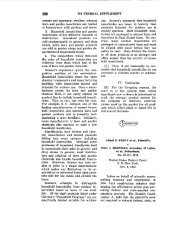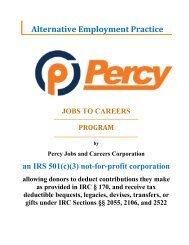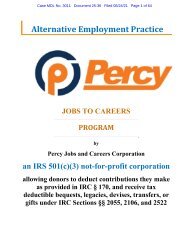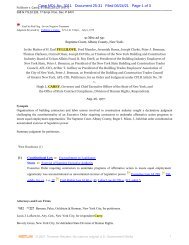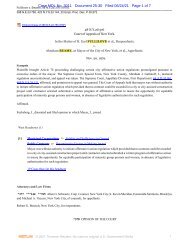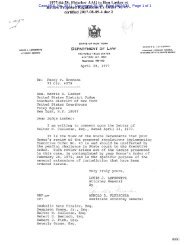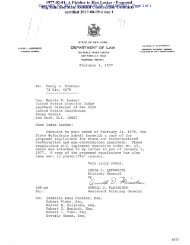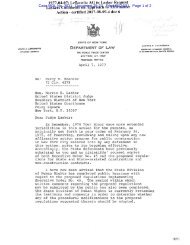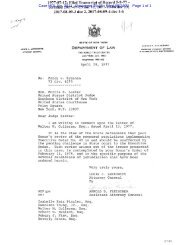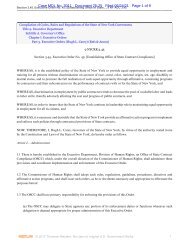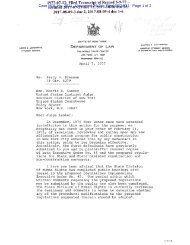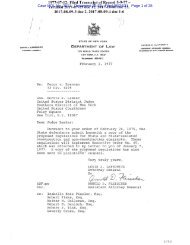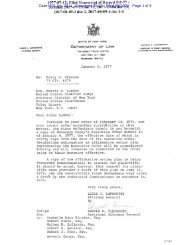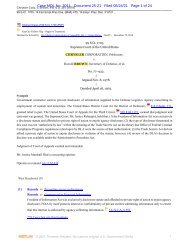42 U.S. Code § 2000e–2 - Unlawful Employment Practices
You also want an ePaper? Increase the reach of your titles
YUMPU automatically turns print PDFs into web optimized ePapers that Google loves.
5/23/2020 <strong>42</strong> U.S. <strong>Code</strong> <strong>§</strong> <strong>2000e–2</strong> - <strong>Unlawful</strong> employment practices | U.S. <strong>Code</strong> | US Law | LII / Legal Information Institute<br />
<strong>42</strong> U.S. <strong>Code</strong> <strong>§</strong> <strong>2000e–2</strong>. <strong>Unlawful</strong> employment practices<br />
U.S. <strong>Code</strong><br />
Notes<br />
(a) E It shall be an unlawful employment practice for<br />
an employer—<br />
(1) to fail or refuse to hire or to discharge any individual, or otherwise<br />
to discriminate against any individual with respect to his compensation,<br />
terms, conditions, or privileges of employment, because of such<br />
individual’s race, color, religion, sex, or national origin; or<br />
(2) to limit, segregate, or classify his employees or applicants for<br />
employment in any way which would deprive or tend to deprive any<br />
individual of employment opportunities or otherwise adversely affect his<br />
status as an employee, because of such individual’s race, color, religion,<br />
sex, or national origin.<br />
(b) E<br />
It shall be an unlawful employment practice for an employment agency to<br />
fail or refuse to refer for employment, or otherwise to discriminate against,<br />
any individual because of his race, color, religion, sex, or national origin, or<br />
to classify or refer for employment any individual on the basis of his race,<br />
color, religion, sex, or national origin.<br />
(c) L It shall be an unlawful employment<br />
practice for a labor organization—<br />
(1) to exclude or to expel from its membership, or otherwise to<br />
discriminate against, any individual because of his race, color, religion,<br />
sex, or national origin;<br />
(2) to limit, segregate, or classify its membership or applicants for<br />
membership, or to classify or fail or refuse to refer for employment any<br />
https://www.law.cornell.edu/uscode/text/<strong>42</strong>/2000e-2 1/9
5/23/2020 <strong>42</strong> U.S. <strong>Code</strong> <strong>§</strong> <strong>2000e–2</strong> - <strong>Unlawful</strong> employment practices | U.S. <strong>Code</strong> | US Law | LII / Legal Information Institute<br />
individual, in any way which would deprive or tend to deprive any<br />
individual of employment opportunities, or would limit such<br />
employment opportunities or otherwise adversely affect his status as an<br />
employee or as an applicant for employment, because of such<br />
individual’s race, color, religion, sex, or national origin; or<br />
(3) to cause or attempt to cause an employer to discriminate against<br />
an individual in violation of this section.<br />
(d) T<br />
It shall be an unlawful employment practice for any employer, labor<br />
organization, or joint labor-management committee controlling<br />
apprenticeship or other training or retraining, including on-the-job training<br />
programs to discriminate against any individual because of his race, color,<br />
religion, sex, or national origin in admission to, or employment in, any<br />
program established to provide apprenticeship or other training.<br />
(e) B<br />
, , ;<br />
Notwithstanding any other provision of this subchapter, (1) it shall not be<br />
an unlawful employment practice for an employer to hire and employ<br />
employees, for an employment agency to classify, or refer for employment<br />
any individual, for a labor organization to classify its membership or to<br />
classify or refer for employment any individual, or for an employer, labor<br />
organization, or joint labor-management committee controlling<br />
apprenticeship or other training or retraining programs to admit or employ<br />
any individual in any such program, on the basis of his religion, sex, or<br />
national origin in those certain instances where religion, sex, or national<br />
origin is a bona fide occupational qualification reasonably necessary to the<br />
normal operation of that particular business or enterprise, and (2) it shall<br />
not be an unlawful employment practice for a school, college, university, or<br />
other educational institution or institution of learning to hire and employ<br />
employees of a particular religion if such school, college, university, or<br />
other educational institution or institution of learning is, in whole or in<br />
substantial part, owned, supported, controlled, or managed by a particular<br />
religion or by a particular religious corporation, association, or society, or if<br />
the curriculum of such school, college, university, or other educational<br />
institution or institution of learning is directed toward the propagation of a<br />
particular religion.<br />
https://www.law.cornell.edu/uscode/text/<strong>42</strong>/2000e-2 2/9
5/23/2020 <strong>42</strong> U.S. <strong>Code</strong> <strong>§</strong> <strong>2000e–2</strong> - <strong>Unlawful</strong> employment practices | U.S. <strong>Code</strong> | US Law | LII / Legal Information Institute<br />
(f) M C P C -<br />
C -<br />
As used in this subchapter, the phrase “unlawful employment practice”<br />
shall not be deemed to include any action or measure taken by an<br />
employer, labor organization, joint labor-management committee, or<br />
employment agency with respect to an individual who is a member of the<br />
Communist Party of the United States or of any other organization required<br />
to register as a Communist-action or Communist-front organization by final<br />
order of the Subversive Activities Control Board pursuant to the Subversive<br />
Activities Control Act of 1950 [50 U.S.C. 781 et seq.].<br />
(g) N Notwithstanding any other provision of this<br />
subchapter, it shall not be an unlawful employment practice for an<br />
employer to fail or refuse to hire and employ any individual for any<br />
position, for an employer to discharge any individual from any position, or<br />
for an employment agency to fail or refuse to refer any individual for<br />
employment in any position, or for a labor organization to fail or refuse to<br />
refer any individual for employment in any position, if—<br />
(1) the occupancy of such position, or access to the premises in or<br />
upon which any part of the duties of such position is performed or is to<br />
be performed, is subject to any requirement imposed in the interest of<br />
the national security of the United States under any security program in<br />
effect pursuant to or administered under any statute of the United<br />
States or any Executive order of the President; and<br />
(2) such individual has not fulfilled or has ceased to fulfill that<br />
requirement.<br />
(h) S ;<br />
; ;<br />
Notwithstanding any other provision of this subchapter, it shall not be an<br />
unlawful employment practice for an employer to apply different standards<br />
of compensation, or different terms, conditions, or privileges of<br />
employment pursuant to a bona fide seniority or merit system, or a system<br />
which measures earnings by quantity or quality of production or to<br />
employees who work in different locations, provided that such differences<br />
are not the result of an intention to discriminate because of race, color,<br />
religion, sex, or national origin, nor shall it be an unlawful employment<br />
practice for an employer to give and to act upon the results of any<br />
professionally developed ability test provided that such test, its<br />
https://www.law.cornell.edu/uscode/text/<strong>42</strong>/2000e-2 3/9
5/23/2020 <strong>42</strong> U.S. <strong>Code</strong> <strong>§</strong> <strong>2000e–2</strong> - <strong>Unlawful</strong> employment practices | U.S. <strong>Code</strong> | US Law | LII / Legal Information Institute<br />
administration or action upon the results is not designed, intended or used<br />
to discriminate because of race, color, religion, sex or national origin. It<br />
shall not be an unlawful employment practice under this subchapter for<br />
any employer to differentiate upon the basis of sex in determining the<br />
amount of the wages or compensation paid or to be paid to employees of<br />
such employer if such differentiation is authorized by the provisions of<br />
section 206(d) of title 29.<br />
(i) B<br />
I<br />
Nothing contained in this subchapter shall apply to any business or<br />
enterprise on or near an Indian reservation with respect to any publicly<br />
announced employment practice of such business or enterprise under<br />
which a preferential treatment is given to any individual because he is an<br />
Indian living on or near a reservation.<br />
(j) P<br />
Nothing contained in this subchapter shall be interpreted to require any<br />
employer, employment agency, labor organization, or joint labormanagement<br />
committee subject to this subchapter to grant preferential<br />
treatment to any individual or to any group because of the race, color,<br />
religion, sex, or national origin of such individual or group on account of an<br />
imbalance which may exist with respect to the total number or percentage<br />
of persons of any race, color, religion, sex, or national origin employed by<br />
any employer, referred or classified for employment by any employment<br />
agency or labor organization, admitted to membership or classified by any<br />
labor organization, or admitted to, or employed in, any apprenticeship or<br />
other training program, in comparison with the total number or percentage<br />
of persons of such race, color, religion, sex, or national origin in any<br />
community, State, section, or other area, or in the available work force in<br />
any community, State, section, or other area.<br />
(k) B<br />
(1)<br />
(A) An unlawful employment practice based on disparate impact is<br />
established under this subchapter only if—<br />
(i) a complaining party demonstrates that a respondent uses a<br />
particular employment practice that causes a disparate impact<br />
on the basis of race, color, religion, sex, or national origin and<br />
https://www.law.cornell.edu/uscode/text/<strong>42</strong>/2000e-2 4/9
5/23/2020 <strong>42</strong> U.S. <strong>Code</strong> <strong>§</strong> <strong>2000e–2</strong> - <strong>Unlawful</strong> employment practices | U.S. <strong>Code</strong> | US Law | LII / Legal Information Institute<br />
the respondent fails to demonstrate that the challenged practice<br />
is job related for the position in question and consistent with<br />
business necessity; or<br />
(ii) the complaining party makes the demonstration described in<br />
subparagraph (C) with respect to an alternative employment<br />
practice and the respondent refuses to adopt such alternative<br />
employment practice.<br />
(B)<br />
(i) With respect to demonstrating that a particular employment<br />
practice causes a disparate impact as described in subparagraph<br />
(A)(i), the complaining party shall demonstrate that each<br />
particular challenged employment practice causes a disparate<br />
impact, except that if the complaining party can demonstrate to<br />
the court that the elements of a respondent’s decisionmaking<br />
process are not capable of separation for analysis, the<br />
decisionmaking process may be analyzed as one employment<br />
practice.<br />
(ii) If the respondent demonstrates that a specific employment<br />
practice does not cause the disparate impact, the respondent<br />
shall not be required to demonstrate that such practice is<br />
required by business necessity.<br />
(C) The demonstration referred to by subparagraph (A)(ii) shall be<br />
in accordance with the law as it existed on June 4, 1989, with<br />
respect to the concept of “alternative employment practice”.<br />
(2) A demonstration that an employment practice is required by<br />
business necessity may not be used as a defense against a claim of<br />
intentional discrimination under this subchapter.<br />
(3) Notwithstanding any other provision of this subchapter, a rule<br />
barring the employment of an individual who currently and knowingly<br />
uses or possesses a controlled substance, as defined in schedules I and<br />
II of section 102(6) of the Controlled Substances Act (21 U.S.C.<br />
802(6)), other than the use or possession of a drug taken under the<br />
supervision of a licensed health care professional, or any other use or<br />
possession authorized by the Controlled Substances Act [21 U.S.C. 801<br />
et seq.] or any other provision of Federal law, shall be considered an<br />
https://www.law.cornell.edu/uscode/text/<strong>42</strong>/2000e-2 5/9
5/23/2020 <strong>42</strong> U.S. <strong>Code</strong> <strong>§</strong> <strong>2000e–2</strong> - <strong>Unlawful</strong> employment practices | U.S. <strong>Code</strong> | US Law | LII / Legal Information Institute<br />
unlawful employment practice under this subchapter only if such rule is<br />
adopted or applied with an intent to discriminate because of race, color,<br />
religion, sex, or national origin.<br />
(l) P<br />
It shall be an unlawful employment practice for a respondent, in<br />
connection with the selection or referral of applicants or candidates for<br />
employment or promotion, to adjust the scores of, use different cutoff<br />
scores for, or otherwise alter the results of, employment related tests on<br />
the basis of race, color, religion, sex, or national origin.<br />
(m) I , , , ,<br />
Except as otherwise provided in this subchapter, an unlawful employment<br />
practice is established when the complaining party demonstrates that race,<br />
color, religion, sex, or national origin was a motivating factor for any<br />
employment practice, even though other factors also motivated the<br />
practice.<br />
(n) R<br />
(1)<br />
(A) Notwithstanding any other provision of law, and except as<br />
provided in paragraph (2), an employment practice that implements<br />
and is within the scope of a litigated or consent judgment or order<br />
that resolves a claim of employment discrimination under the<br />
Constitution or Federal civil rights laws may not be challenged<br />
under the circumstances described in subparagraph (B).<br />
(B) A practice described in subparagraph (A) may not be<br />
challenged in a claim under the Constitution or Federal civil rights<br />
laws—<br />
(i) by a person who, prior to the entry of the judgment or order<br />
described in subparagraph (A), had—<br />
(I) actual notice of the proposed judgment or order<br />
sufficient to apprise such person that such judgment or order<br />
might adversely affect the interests and legal rights of such<br />
person and that an opportunity was available to present<br />
objections to such judgment or order by a future date<br />
certain; and<br />
https://www.law.cornell.edu/uscode/text/<strong>42</strong>/2000e-2 6/9
5/23/2020 <strong>42</strong> U.S. <strong>Code</strong> <strong>§</strong> <strong>2000e–2</strong> - <strong>Unlawful</strong> employment practices | U.S. <strong>Code</strong> | US Law | LII / Legal Information Institute<br />
(II) a reasonable opportunity to present objections to such<br />
judgment or order; or<br />
(ii) by a person whose interests were adequately represented<br />
by another person who had previously challenged the judgment<br />
or order on the same legal grounds and with a similar factual<br />
situation, unless there has been an intervening change in law or<br />
fact.<br />
(2) Nothing in this subsection shall be construed to—<br />
(A) alter the standards for intervention under rule 24 of the Federal<br />
Rules of Civil Procedure or apply to the rights of parties who have<br />
successfully intervened pursuant to such rule in the proceeding in<br />
which the parties intervened;<br />
(B) apply to the rights of parties to the action in which a litigated or<br />
consent judgment or order was entered, or of members of a class<br />
represented or sought to be represented in such action, or of<br />
members of a group on whose behalf relief was sought in such<br />
action by the Federal Government;<br />
(C) prevent challenges to a litigated or consent judgment or order<br />
on the ground that such judgment or order was obtained through<br />
collusion or fraud, or is transparently invalid or was entered by a<br />
court lacking subject matter jurisdiction; or<br />
(D) authorize or permit the denial to any person of the due process<br />
of law required by the Constitution.<br />
(3) Any action not precluded under this subsection that challenges an<br />
employment consent judgment or order described in paragraph (1)<br />
shall be brought in the court, and if possible before the judge, that<br />
entered such judgment or order. Nothing in this subsection shall<br />
preclude a transfer of such action pursuant to section 1404 of title 28.<br />
(Pub. L. 88–352, title VII, <strong>§</strong> 703, July 2, 1964, 78 Stat. 255; Pub. L. 92–261,<br />
<strong>§</strong> 8(a), (b), Mar. 24, 1972, 86 Stat. 109; Pub. L. 102–166, title I, <strong>§</strong><strong>§</strong> 105(a),<br />
106, 107(a), 108, Nov. 21, 1991, 105 Stat. 1074–1076.)<br />
https://www.law.cornell.edu/uscode/text/<strong>42</strong>/2000e-2 7/9
5/23/2020 <strong>42</strong> U.S. <strong>Code</strong> <strong>§</strong> <strong>2000e–2</strong> - <strong>Unlawful</strong> employment practices | U.S. <strong>Code</strong> | US Law | LII / Legal Information Institute<br />
A Lawyer Will Answer in Minutes! Questions<br />
Answered Every 9 Seconds.<br />
OPEN<br />
<br />
U.S. <strong>Code</strong> Toolbox<br />
Law about... Articles from Wex<br />
Table of Popular Names<br />
Parallel Table of Authorities<br />
How current is this?<br />
18 87<br />
https://www.law.cornell.edu/uscode/text/<strong>42</strong>/2000e-2 8/9
5/23/2020 <strong>42</strong> U.S. <strong>Code</strong> <strong>§</strong> <strong>2000e–2</strong> - <strong>Unlawful</strong> employment practices | U.S. <strong>Code</strong> | US Law | LII / Legal Information Institute<br />
ACCESSIBILITY<br />
ABOUT LII<br />
CONTACT US<br />
ADVERTISE HERE<br />
HELP<br />
TERMS OF USE<br />
PRIVACY<br />
https://www.law.cornell.edu/uscode/text/<strong>42</strong>/2000e-2 9/9



